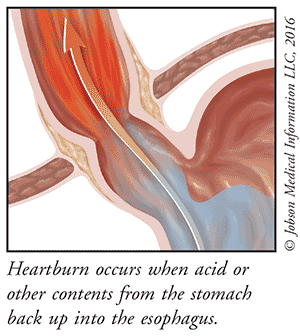US Pharm. 2016;41(12):13-14.
Acid Indigestion
Heartburn is the common term used to describe a burning sensation in the upper chest. Although it is called heartburn, it is not related to the heart at all. Heartburn is caused by stomach acid moving back up into the esophagus, the tube that carries food from the mouth to the stomach. Occasional heartburn is usually self-treated with nonprescription antacids or OTC acid blockers. A doctor should evaluate frequent, persistent heartburn not relieved by nonprescription products, or heartburn with other symptoms, such as difficult or painful swallowing, hoarseness, nausea, or vomiting. These symptoms could be a sign of GERD (gastrointestinal reflux disease) or another condition that can be treated with prescription medications.

Symptoms Could Be a Sign of GERD
Occasional heartburn is common, especially after eating a large meal, when bending over, or upon lying down. OTC products can effectively treat this type of heartburn. Frequent heartburn (several times a week for 2 weeks) may be a symptom of a long-term condition known as GERD, or gastrointestinal reflux disease. GERD affects between 20% and 30% of the U.S. population. Persistent heartburn can also be a sign of other problems, such as peptic ulcer or hiatal hernia.
When food is swallowed, it travels from the mouth, through the esophagus, and into the stomach. A sphincter, or ring of muscle at the base of the esophagus, closes up once the food reaches the stomach. This muscle, called the lower esophageal sphincter, prevents the acidic stomach contents from moving backward (refluxing) into the esophagus and causing irritation.
Reflux Symptoms and Triggers
Heartburn is a symptom of acid reflux, which occurs when the esophageal sphincter does not close completely. A hiatal hernia, a condition in which part of the stomach is pushed up into the chest area through the diaphragm wall, can also cause heartburn.
Common triggers for heartburn symptoms are caffeine, alcohol, and carbonated drinks. Food triggers include tomato products, citrus, onions, chocolate, peppermint, fried foods, and certain spices. Some medications can cause heartburn, including aspirin, ibuprofen, and prescription medications for high blood pressure or anxiety. Bending over or lying down after eating, eating large meals, and smoking also increase heartburn. Pregnancy, obesity, and tight clothing can also lead to acid reflux.
Most people describe heartburn as a painful burning sensation in the chest, sometimes along with a sour taste in the mouth and throat. When neutralized by an antacid, the burning sensation goes away. If heartburn does not respond to antacids, this problem should be discussed with a doctor. A physician should evaluate heartburn that occurs frequently for more than 2 weeks or is accompanied by trouble swallowing, painful swallowing, hoarseness, nausea or vomiting, or dark stools. If chronic acid reflux goes untreated, it can lead to inflammation and narrowing of the esophagus, precancerous changes, and cancer of the esophagus.
Persistent heartburn can be evaluated using a barium x-ray to look for ulcers, a pH test to check for stomach acid in the esophagus, gastric emptying tests, or endoscopy. Endoscopy allows the doctor to see the esophagus and stomach lining through a thin tube with a lighted camera at its end that is inserted down the esophagus. During endoscopy, a small tissue sample can be removed for analysis and damage to the esophageal lining can be evaluated.
Antacids and Other Treatment Options
Lifestyle changes can help control heartburn. Weight loss, smoking cessation, loose clothing, and avoiding alcohol, caffeine, and trigger foods can be very effective. Waiting at least 3 hours after eating to lie down and raising the head of the bed with 6-inch blocks helps relieve nighttime symptoms. Sleeping on several pillows can worsen heartburn by putting pressure on the stomach.
Nonprescription antacids are effective for short-term relief, but the regular use of antacids can cause constipation or diarrhea. More serious heartburn can be treated with drugs that lower the production of stomach acid, including histamine2 receptor antagonists (H2RAs; e.g., cimetidine, ranitidine, and famotidine) or proton pump inhibitors (e.g., omeprazole, lansoprazole, and rabeprazole). Proton pump inhibitors are more effective than H2RAs in lowering acid production, so H2RAs and antacids are often prescribed together. Some acid-blocking drugs are available in nonprescription strengths. If heartburn occurs frequently or if nonprescription antacids or acid blockers are not effective, the condition should be evaluated by a doctor.
To comment on this article, contact rdavidson@uspharmacist.com.





